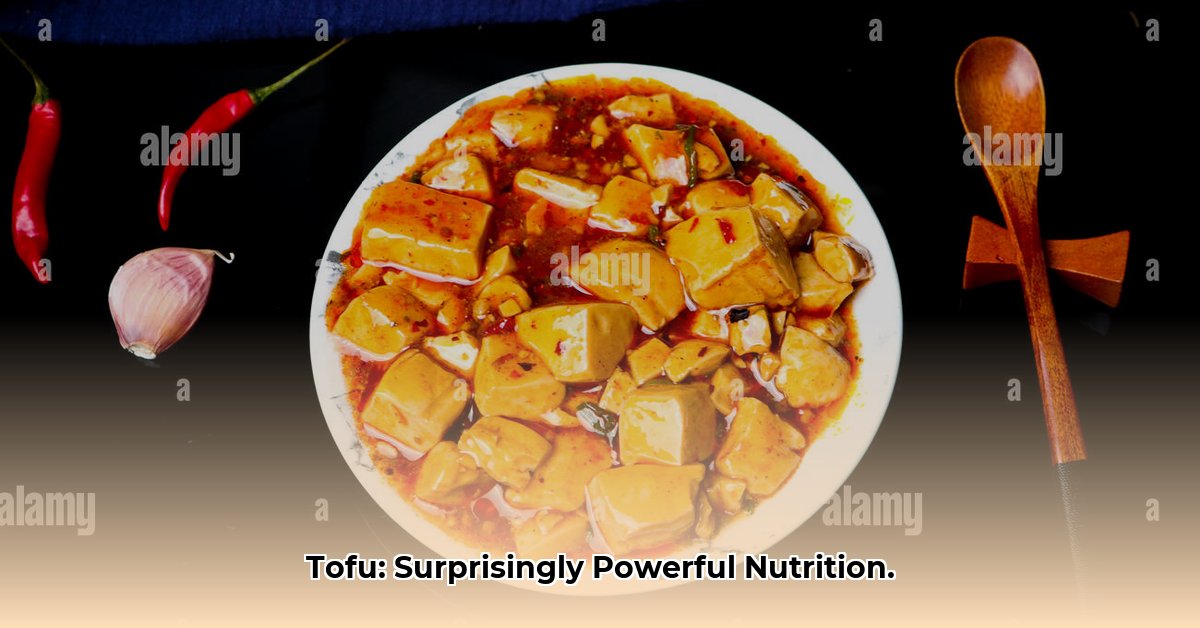Decoding the Nutritional Power of Tofu
Tofu, a soybean-based staple in many cuisines, has gained global recognition for its versatility and nutritional benefits. This guide delves into tofu’s nutritional profile, explores its various forms, and discusses its potential health impacts.
Macronutrients: The Foundation of Tofu’s Nutritional Profile
Tofu stands out as a plant-based protein source, providing all nine essential amino acids. A 3.5-ounce (100g) serving of firm tofu offers approximately 8g of protein, vital for muscle building and repair. It’s relatively low in carbohydrates, with about 2g per serving, and contains around 5g of fat, primarily unsaturated fats known for their heart-healthy benefits.
Micronutrients: Tofu’s Hidden Treasures
Beyond macronutrients, tofu is a good source of several essential micronutrients. It provides calcium, crucial for bone health, especially beneficial for those following plant-based diets. Tofu also contributes iron, important for oxygen transport and red blood cell production, and magnesium and potassium, which play roles in nerve and muscle function.
Tofu’s Nutritional Profile: At a Glance
| Nutrient | Amount per 100g | % Daily Value* |
|---|---|---|
| Calories | ~70 | ~3% |
| Protein | ~8g | ~16% |
| Fat | ~5g | ~8% |
| Saturated Fat | ~1g | ~5% |
| Carbohydrates | ~2g | ~1% |
| Fiber | ~1g | ~4% |
| Calcium | ~175mg | ~18% |
| Iron | ~2mg | ~11% |
| Magnesium | ~60mg | ~15% |
| Potassium | ~120mg | ~3% |
*Percent Daily Values are based on a 2,000 calorie diet. Your daily values may be higher or lower depending on your calorie needs. Data may vary slightly depending on the brand and preparation method. For precise values, refer to the USDA FoodData Central website (https://fdc.nal.usda.gov/).
Exploring Tofu Varieties: From Silken to Extra-Firm
Tofu’s texture varies from silken (soft and creamy) to extra-firm (dense and chewy), based on the water content. Silken tofu, with higher water content, is ideal for smoothies and desserts. Firmer varieties, with less water and concentrated nutrients, are suitable for stir-fries and grilling.
Cooking Methods and Nutritional Impact
Cooking methods influence tofu’s nutritional value. Frying adds extra fat and calories. Healthier options include baking, steaming, or boiling, which preserve nutrients without adding unnecessary extras. Marinating can enhance flavor and potentially boost nutritional content.
Tofu vs. Other Protein Sources
Compared to chicken breast, tofu offers comparable protein with less fat, especially saturated fat, and is cholesterol-free. This makes it a strong contender for those seeking lean, plant-based protein.
Understanding Soy Isoflavones
Tofu contains isoflavones, plant compounds with weak estrogen-like effects. Some research suggests potential benefits for heart health and bone density, while other studies explore potential risks. The current scientific consensus generally considers soy foods, including tofu, safe for consumption as part of a balanced diet. However, more research is needed to fully understand the effects of isoflavones on human health. Individuals with specific concerns should consult with a healthcare professional.
Health Benefits: A Deeper Dive
Emerging research suggests potential links between tofu consumption and various health benefits, including:
- Heart Health: Tofu’s low saturated fat content and potential cholesterol-lowering effects may contribute to heart health. Isoflavones may also play a role in improving blood vessel function.
- Bone Health: Tofu’s calcium and isoflavone content may support bone health and potentially reduce the risk of osteoporosis.
- Menopausal Symptom Relief: Some studies suggest that isoflavones might help alleviate certain menopausal symptoms like hot flashes, though more conclusive research is needed.
- Cognitive Function: Preliminary research indicates a possible association between tofu consumption and cognitive benefits, but further studies are necessary to confirm these findings.
Incorporating Tofu into Your Diet: Tips and Ideas
Tofu’s versatility makes it easy to incorporate into various dishes.
- Crumble it: Add crumbled tofu to scrambles, tacos, or chili for a protein boost.
- Cube it: Use cubed tofu in stir-fries, curries, or soups.
- Slice it: Marinate and grill or bake tofu slices for sandwiches or salads.
- Blend it: Add silken tofu to smoothies, dips, or sauces for a creamy texture.
Experiment with different flavors and textures to discover your favorite ways to enjoy tofu’s nutritional benefits. There are many recipes available online and in cookbooks, offering a range of possibilities from simple weeknight meals to more elaborate culinary creations.
Points to Consider
- While generally considered safe, some individuals may experience digestive discomfort with soy products. Start with small portions and gradually increase intake as tolerated.
- Some research suggests potential interactions between soy isoflavones and certain medications, including thyroid hormone replacement therapy. Individuals taking medication should consult their doctor before significantly increasing soy intake.
- Pay attention to added ingredients. Some processed tofu products may contain high levels of sodium or other additives. Choose minimally processed varieties whenever possible.
This guide offers a comprehensive overview of tofu’s nutritional value and potential health benefits. While research is ongoing, current evidence suggests that tofu can be a valuable addition to a balanced diet. Remember to consult with a healthcare provider or registered dietitian for personalized dietary advice.
- Food Making Kits Bring Easy, Fun Homemade Dishes to Your Kitchen - February 5, 2026
- Cooking Kits Make Mastering New Recipes Fun for Everyone - February 4, 2026
- Leak-Proof Glass Food Containers with Locking Lids Keep Food Fresh - February 3, 2026










